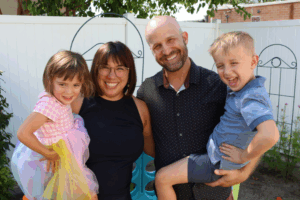Elvis once sang about feeling blue at Christmas time, and I’m here to tell you: It’s perfectly normal to feel that way.
There are many reasons why your days may not be merry and bright around the holiday season. Jam-packed social calendars, deadlines at work, loss of a loved one, sunless, dark winter days, financial pressures surrounding gift giving…sound familiar?
Still, you can prepare and hopefully deflect some of the increased stress of the season. It’s important to realize that you have more control than you think. Here are six common issues that come up this time of year, followed by ways to address them.
1. You’re Lacking the “Holiday Spirit”
Being surrounded by cheeriness can be difficult when you don’t feel the same level of enthusiasm as others. The pressure to be social, happy and present can make it hard to speak up if you feel otherwise.
- Recognize that you don’t need to force yourself to be happy and that it’s good to acknowledge feelings that aren’t joyful; remember that you are not alone in feeling this way.
- Trying to numb or avoid feelings by using alcohol or other substances just worsens anxiety and depression.
- If possible, surround yourself with people who feel similarly; celebrate your traditions or create new ones.
2. You’re Overwhelmed by Grief and Loss
If you are living with grief, loss, trauma or loneliness, it can be easy to compare your situation to others’, and this can increase feelings of loneliness or sadness. Check in with yourself so that you’ll have realistic expectations for how the holiday season will be. Gently remind yourself that as circumstances change, traditions will change as well.
- If holiday observances seem inauthentic right now, you do not need to force yourself to celebrate.
- Perhaps connect with a support group, therapist, faith community or friends who understand.
- Let your loved ones know how they can support you, whether it’s helping you with shopping or meeting up for a regular walk. Often, people want to help, but don’t know what to say or where to start.
3. You’re Feeling Pressured to Participate in Activities You’d Rather Not
We all have our own personal history with holidays. We have visions about the ways the holidays are “supposed” to be, which can be a distorted perspective.
- Recognize that most people feel at least a little stressed during the season.
- Prioritize the most important activities, or schedule get-togethers for after the holidays, and learn to say no if you need to.
- Make a schedule of when you will do your shopping, baking and cleaning—and be sure to include time to take care of yourself.
- Instead of spending the holidays the way you think you “should,” opt for an activity you actually feel like doing, whether it’s making a favorite dish or having a Netflix marathon.
- Regardless of your plans, try to make your intentions known to friends and family early in the holiday season so everyone knows what to expect.
4. You’re Stressed About Giving Gifts
It’s so common to get caught up in the commercialization of the holidays. We can feel stressed about spending on a strained budget or trying to find just the right gift. Advertisers take advantage of our susceptibility and make us feel as if we need to buy more than we can. But giving to others is not about spending money. We need to remind ourselves that we are the ones creating that anxiety, and we can reduce it by setting realistic expectations.
- Consider how much money you can comfortably spend and stick to the amount.
- If purchasing gifts for everyone is difficult, consider having a secret Santa or white elephant exchange to reduce the number of items everyone needs to buy.
- Simply let people know you are unable to give gifts this year.
- Sometimes personal gifts—like a poem, short story or framed photo—are the best ones. How about the gift of helping a neighbor, a friend, a family member or a stranger? It’s the act of giving that is more important than a present. Our generosity can be a gift to ourselves, because when we focus on others and less on ourselves, we tend to reduce our anxiety.
5. There’s Not Much Sunlight, and It’s Affecting Your Mood
In the northern hemisphere, the holidays coincide with winter’s lack of available sunlight. Less exposure to natural light can lead to new or increased symptoms of depression.
- Try to get as much sunlight as possible.
- To boost your mood and regulate sleep, schedule outdoor exercise in the middle of the day when the sun is brightest. If you can, work near a window throughout the day. Even outfitting your home with warm, bright lighting can help improve your mood.
- If you feel the need to slow your pace and stay home this time of year, consider reframing the winter months as an opportunity to work on “quieter” projects and activities suited for the indoors, such as writing, knitting or taking online courses.
- Seasonal affective disorder (SAD) is a more severe form of the winter blues. If you feel hopeless, have suicidal thoughts, or changes in appetite and sleep patterns, talk to your doctor. Effective treatments for SAD include light therapy, talk therapy and medication.
6. You’re Alone or Feeling Isolated
While it’s true that many of us have friends and family to connect with during the holiday season, we can still have feelings of isolation. If you have a predisposition to depression or anxiety, it can be hard to reach out to others.
- Remind yourself of the people, places and things that make you happy. Consider scheduling a call or video chat with friends or loved ones on a weekly or biweekly basis so you don’t have to think twice about making the effort.
- Take advantage of other ways to connect, including sending out holiday cards and communicating with family and friends by phone, text, email and social media.
- Calming activities, such as reading, meditating and gratitude journaling, can be positive ways to spend time if you are alone or don’t feel comfortable in social situations.
- Remember self-care! We hear about the importance of a balanced diet, moderate exercise and plenty of sleep, but because there are so many distractions and stressors this time of year, we lose sight of some of these basic necessities. We need to take care of ourselves in order to navigate the holiday season.
Don’t be afraid to ask for help. You are not alone, even though it may feel like it. If you have been feeling anxious or depressed for more than two weeks, or if the holidays are long gone and you are still feeling stressed, anxious or depressed, please take one of our free, confidential online screenings, or talk to your primary care or mental health care provider.
Stacy Waldron, PhD, LP
Psychologist, Bryan Counseling Center
Stacy Waldron, PhD, is a licensed psychologist at Bryan Counseling Center. She provides treatment for individuals of all ages and specializes in working with adolescents and adults.









